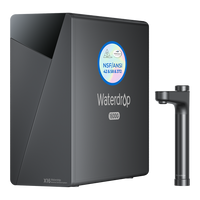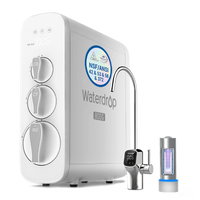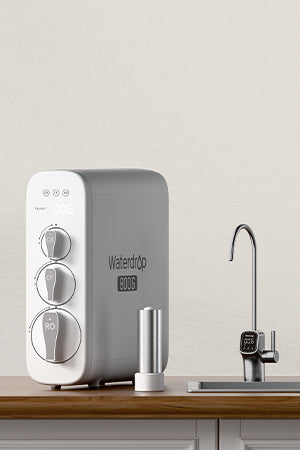When it comes to bottled water, many of us reach for familiar brands like Dasani. But is Dasani water good for you? This expanded article goes deeper into the health aspects, production process, ingredients, concerns and what Canadian consumers should consider when choosing bottled water.
What Is Dasani Water?
Dasani is a bottled water brand owned by
Coca-Cola . It’s important to note that Dasani is not natural spring water. Instead it starts as municipal tap water from local water supplies which is purified before bottling.
The purification process includes:
-
Reverse osmosis : water is forced through semi-permeable membranes that remove most impurities – including minerals, metals and organic contaminants.
- Ultraviolet light treatment: disinfects water by killing microorganisms.
- Ozonation: ozonation uses ozone gas to further sanitize the water without leaving any chemical residue.
After purification Dasani adds back a specially formulated blend of minerals – magnesium sulfate, potassium chloride and a small amount of salt – to enhance taste and consistency. This re-mineralization is intended to provide a consistent taste profile across batches.
Health Considerations of Dasani Water Ingredients
The minerals added to Dasani to improve taste have raised questions among some consumers and health commentators.
Magnesium sulfate (Epsom salt) is added in small measured amounts. While in very large doses it can cause heart disturbances and lowered blood pressure, the trace amounts in Dasani are considered safe for normal consumption.
Potassium chloride is a mineral salt often used as a fertilizer and, medically, in lethal injections at high doses. The amount added in bottled water is minuscule and deemed safe. It adds a slight bitter taste but has no effect on heart health or kidney function at these levels.
There is no scientific evidence that these ingredients in the amounts present in Dasani water harm health. But some critics say these additives, especially salt, might increase thirst and encourage people to drink more water.
pH Level and Acidity
Dasani water has a measured pH of 5.6 which is slightly acidic (like black coffee). Most neutral waters are around pH 7. Slight acidity in bottled water is generally safe but can cause minor digestive discomfort for people with sensitive stomachs or acid reflux.
Overall pH shouldn’t deter you from drinking Dasani but if you’re sensitive you may want to consider more neutral or alkaline waters.
Microplastics and Packaging Concerns
Like many bottled waters Dasani has been scrutinized for
microplastic contamination .
Studies have found that bottled water brands including Dasani may contain microplastics and nanoplastics, tiny plastic particles that can enter the human body through ingestion. Though research on health impacts is ongoing these particles have been linked in some studies to inflammation, endocrine disruption and other health risks.
The plastic bottles use
polyethylene terephthalate (PET) and plasticizers such as BPA or BPA alternatives may leach into the water posing potential health risks including increased cancer risk according to some toxicological reviews.
This has led some health experts and environmentally conscious consumers to prefer filtered tap water or alternative packaging options over single-use bottled water.
Comparison with Tap Water and Other Bottled Waters
Lab tests show Dasani water is essentially purified municipal tap water with minerals added back. It doesn’t offer any health benefits over clean tap water. In fact some studies and consumer feedback rate its taste as inferior – sometimes described as “metallic” or “chalky” – and lower in quality than natural spring or mineral waters.
Municipal tap water quality varies widely across Canadian regions but public water systems in Canada are generally safe, strict in regulation and tested frequently. Canadians may find filtered tap water at home a cost-effective and environmentally friendly option.
Natural mineral or spring waters often have a range of naturally occurring minerals that some argue offer better electrolyte balance and taste than
re-mineralized purified water like Dasani.
What Should Canadian Consumers Consider?
Taste and convenience
Dasani offers consistent taste and purity through its rigorous purification and controlled mineral addition. This may appeal to consumers looking for a reliable bottled water brand.
Health aspects
The mineral additives are safe in typical consumption amounts but people with kidney issues or strict dietary restrictions should consult their healthcare provider.
Environmental impact
Plastic bottle waste and microplastic contamination are concerns. Consider reusable bottles and home filtration to reduce single-use plastic reliance.
Alternatives
If concerned about microplastics or additives try Canadian natural spring waters, mineral waters or filtered tap water with a
home reverse osmosis system .
Hydration Is Key: Why Drinking Enough Water Daily Matters Most
While debates about the best type of bottled water – be it Dasani, spring, mineral or filtered tap water – can be important for taste, environmental impact and nutritional considerations the single most important factor for health is hydration. Your body relies on water for nearly every function it performs. Water makes up about 60% of an adult’s body weight and is needed for:
- Regulating body temperature through sweat and respiration
- Transporting nutrients and oxygen to cells via the bloodstream
- Lubricating joints and protecting tissues such as the brain, spinal cord and eyes
- Aiding digestion and preventing constipation
- Flushing toxins and waste products through urine and perspiration
- Maintaining healthy skin by supporting elasticity and moisture balance
Even mild dehydration – losing as little as 1-2% of your body’s water – can cause fatigue, headaches, decreased focus and mood fluctuations.










































































